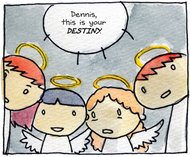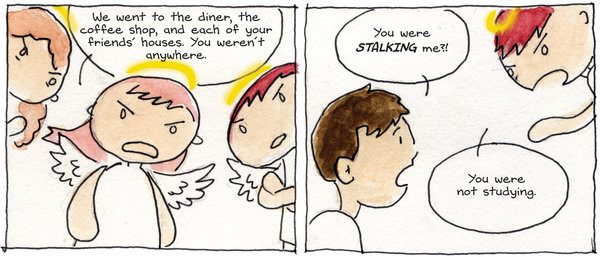To a degree, Gene Luen Yang's new book Level Up is more of the same. I've compared him to O. Henry before, and the label still fits. His stories all have elegant plot structures, broad characterizations, more than a dollop of sentimentality, and one or more plot twists. Race, family and faith tend to be his dominant themes, all tinged with a fantasy element. That these comics are from the perspective of an Asian-American and tend to represent that experience gives them some novelty, but the underpinnings are entirely familiar. That said, Level Up represents a step forward in his development as a writer, in part because of his choice of Thien Pham as his illustrator for this story.
The highly versatile Derek Kirk Kim made a great partner for Yang in The Eternal Smile, a trio of unconnected stories that shared some thematic similarities. The problem with that book is that Kim's aesthetic isn't too far away from Yang's. Yang's art is extremely slick and sometimes hard to latch on to as a reader at an aesthetic level, which in turn makes it difficult to invest in his characters. Considering that much of American Born Chinese (Yang's first book) came out of his personal experiences growing up as an Asian-American in a predominantly Caucasian area, it felt odd that his characters felt so much like characters—artifices being manipulated by an author—and so little like living, breathing people. Kim's art added life to Yang's story and gave it some resonance, but the characters once again felt like actors rather than people.
Pham, on the other hand, is an artist whose instincts seem to be almost directly contrary to Yang's. He's minimalist and almost childlike in his renderings. He's essentially a minicomics guy given slick paper and the opportunity to use watercolors. His main flaw as an artist has always been his sloppiness, especially in terms of lettering and balloon placement. Working with Yang tightened up some of those flaws, while working with Pham helped loosen up Yang and let his pages breathe a bit more. It's perhaps not coincidental that Level Up features Yang's best-realized, most human set of characters. Of course, Pham and Yang may well have differing aesthetic approaches, but there is obviously great chemistry between the two in terms of an understanding of the various cultures depicted in the book: Asian America, video games, and school.
The book concerns Dennis, a young Asian American man who is torn between his first love (playing video games) and the desires of his parents (going to medical school). Like many Asian parents, they view video games as not only frivolous, but as an outright form of betrayal to values of hard work, sacrifice, and family. At one point, his father seems especially withholding of his love, an act that haunts Dennis to the point that he immediately stops trying hard when his father dies two weeks shy of his high school graduation.
 As Dennis constantly indulges in video games (but is haunted by guilt as he sees his father's visage everywhere), he fails out of school. Then the book takes a magical realist turn, as a quartet of angels shows up to scold Dennis and set him on the right path. He quits playing video games (losing a friend in the process) and is at last ready to study. The angels terrify his dean into letting him back into school, cook his meals, help him study, and do his laundry. Curiously, they have very specific plans for him: his destiny is to become a gastroenterologist.
As Dennis constantly indulges in video games (but is haunted by guilt as he sees his father's visage everywhere), he fails out of school. Then the book takes a magical realist turn, as a quartet of angels shows up to scold Dennis and set him on the right path. He quits playing video games (losing a friend in the process) and is at last ready to study. The angels terrify his dean into letting him back into school, cook his meals, help him study, and do his laundry. Curiously, they have very specific plans for him: his destiny is to become a gastroenterologist.
The book becomes richer when Dennis goes to medical school and we meet the group that will become his study partners and best friends. There's a level of detail in depicting each character's backstory that was lacking in past books of Yang's, including many moments that are not at all relevant to the plot at hand but still enrich the book's emotional narrative. When Dennis goes through a series of reversals and decides to quit medical school, that brings up a key scene where he has to confront his angels. Their belligerent response and transformation into different, more frightening forms leads into both the book's emotional climax and a magnificent sight gag that Pham wisely underplays. From there, Yang can't resist a bit of moralizing after revealing that twist and letting Dennis achieve his dream of being a professional video gamer. While still holding fast to that moralist stance, Yang provides a clever bit of wriggle-room compromise with the book's final scene, where Dennis learns that his skills as a video-gamer and his potential future as a doctor aren't necessarily incommensurate. Level Up represents a step forward for Yang because it represents a first rippling of ambiguity for a solid artist who has been limited in some ways by his conservatism—both in terms of aesthetic and narrative choices.









